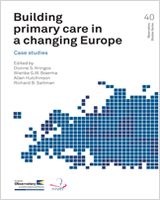Building primary care in a changing Europe
Observatory Studies Series, No. 40
Editors
Editors: Dionne S. Kringos, Wienke G.W. Boerma, Allen Hutchinson, and Richard B. Saltman.This new volume consists of structured case studies summarizing the state of primary care in 31 European countries. It complements the previous study, Building primary care in a changing Europe, in which we provided an overview of the state of primary care across the continent, including aspects of governance, financing, workforce and details of service profiles.
These case studies establish the context of primary care in each country; the key governance and economic conditions; the development of the primary care workforce; how primary care services are delivered; and an assessment of the quality and efficiency of the primary-care system.
The studies exemplify the broad national variations in accessibility, continuity and coordination of primary care in Europe today, something which complicates the assessment of primary care’s role in contributing to the overall performance of the health system despite growing evidence of the added value of a strong primary care sector.
This book builds on the EU-funded project ‘Primary Health Care Activity Monitor for Europe’ (PHAMEU) that was led by the Netherlands Institute for Health Services Research (NIVEL) and co-funded by the European Commission (Directorate General Health & Consumers).
The European Observatory on Health Systems and Policies supports and promotes evidence based health policy-making through comprehensive and rigorous analysis of health systems in Europe. It brings together a wide range of policy-makers, academics and practitioners to analyse trends in health reform, drawing on experience from across Europe to illuminate policy issues.
The European Observatory on Health Systems and Policies is a partnership, hosted by the WHO Regional Office for Europe, which includes the Governments of Austria, Belgium, Finland, Ireland, Norway, Slovenia, Sweden, the United Kingdom and the Veneto Region of Italy; the European Commission; the World Bank; UNCAM (French National Union of Health Insurance Funds); the London School of Economics and Political Science; and the London School of Hygiene & Tropical Medicine.
All rights reserved. The European Observatory on Health Systems and Policies welcomes requests for permission to reproduce or translate its publications, in part or in full.
The designations employed and the presentation of the material in this publication do not imply the expression of any opinion whatsoever on the part of the European Observatory on Health Systems and Policies concerning the legal status of any country, territory, city or area or of its authorities, or concerning the delimitation of its frontiers or boundaries. Dotted lines on maps represent approximate border lines for which there may not yet be full agreement.
The mention of specific companies or of certain manufacturers’ products does not imply that they are endorsed or recommended by the European Observatory on Health Systems and Policies in preference to others of a similar nature that are not mentioned. Errors and omissions excepted, the names of proprietary products are distinguished by initial capital letters.
All reasonable precautions have been taken by the European Observatory on Health Systems and Policies to verify the information contained in this publication. However, the published material is being distributed without warranty of any kind, either express or implied. The responsibility for the interpretation and use of the material lies with the reader. In no event shall the European Observatory on Health Systems and Policies be liable for damages arising from its use. The views expressed by authors, editors, or expert groups do not necessarily represent the decisions or the stated policy of the European Observatory on Health Systems and Policies or any of its partners.
Printed in the United Kingdom
Typeset by Steve Still
Cover design by M2M


